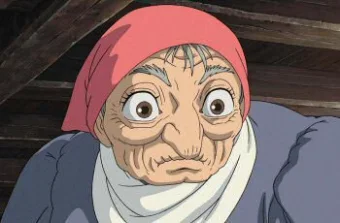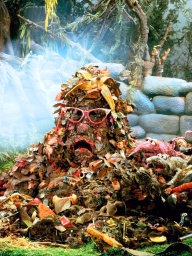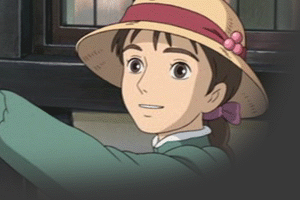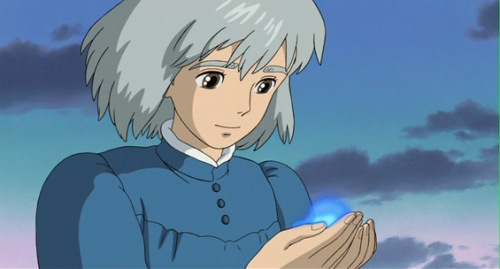 Virgin. Mother. Crone. The life cycle of a woman according to her lady bits.
Virgin. Mother. Crone. The life cycle of a woman according to her lady bits.
In Lynne Masland’s “The crone: emerging voice in a feminine symbolic discourse”, the crone is “an alternative symbolic discourse that permits women’s voices to be ‘heard.'” No men to impress, so close to death, she just doesn’t give a fuck. This is Baubo lifting up her skirt in Demeter’s grieving face.
In Diana Wynne Jones’ Howl’s Moving Castle, Sophie Hatter doesn’t have a choice, or a voice. As the eldest, she is to take over the hat shop, and if she ever were to “seek her fortune,” it would only bring catastrophe. So while Sophie is exploited in the hat shop, her stepmother gads and her sisters become sexy witches and bakers. Because of Sophie’s pathetic resignation, she is a plain, quiet, and hollow domestic person. Nothing.
Out of nowhere, the Witch of the Waste enters the hat shop.
BAM! Old age! And she can’t tell anyone.
I’m not afraid of getting old, it’s a privilege and a luxury, but I am afraid of unnecessary premature aging. The deleterious effects of smoking, weight gain, pregnancy, migraines, painkillers, hypochondria. I’m afraid immortality is only a century away and we’re all going to miss out. I’m afraid of wasting time. Bad structuring. Sloth.
There’s still so much work to be done.
I do love my graying hairs though.
Crones are usually harbingers of death.
Sophie hobbles to the rainy hills and settles herself inside Howl’s castle. More afraid of her immediate pains than of hearteater Howl, she makes herself comfortable in front of the fire, Howl’s fire demon, Calcifer, a falling star, now, the engine of the castle, Howl’s heart.
Here, Hayao Miyazaki‘s gorgeous adaptation splits from the book’s plot.
I’ll bounce back and forth between versions, but it’s no matter as the themes are similar.
And spoilers. Always spoilers here.
Sophie’s appearance now resembles her interior. Waiting for death, she withdraws from society.
 Western culture doesn’t tend to find the crone all that interesting, barely ever one tall enough to stretch out of a trope. First, the negative clichés: she can be evil, like when the queen transforms herself into a hag to kill Snow White; she can be crazy, hurling bags of cats; or she can represent staunch morality (fucking Dolores fucking Umbridge), or a horrid super ego the heroine must shake off. Or, she can be the warm vanilla grandmother, or the wise earth mother, à la the Trash Heap from Fraggle Rock. Only the Trash Heap won’t be ignored. The rest stand as wallpaper, even mothers of middle-aged protagonists, wise then gone. Usually dead. If there’s a middle-aged protagonist woman and an elderly mother, one of them is going to die.
Western culture doesn’t tend to find the crone all that interesting, barely ever one tall enough to stretch out of a trope. First, the negative clichés: she can be evil, like when the queen transforms herself into a hag to kill Snow White; she can be crazy, hurling bags of cats; or she can represent staunch morality (fucking Dolores fucking Umbridge), or a horrid super ego the heroine must shake off. Or, she can be the warm vanilla grandmother, or the wise earth mother, à la the Trash Heap from Fraggle Rock. Only the Trash Heap won’t be ignored. The rest stand as wallpaper, even mothers of middle-aged protagonists, wise then gone. Usually dead. If there’s a middle-aged protagonist woman and an elderly mother, one of them is going to die.
Masland writes,
Because any image [of the old woman] is collectively created, it loses power and voice through indifference toward the topic on the part of the audience and writers.
As wallpaper, Sophie can blend into the background, Howl’s background, and make herself useful. She uses the trope to her advantage. She wants to be invisible, she doesn’t want to be heard, because all she wants to say is that she’s cursed, but she can’t. So she resigns to silence.
I also have a fear of not being listened to, not being taken seriously. It’s more of a neurosis. It stems from a severe distrust of the patriarchy. When I encounter the feeling I become enraged.
In Howl’s Moving Castle the crone is the protagonist, something precious and rare, but because Sophie isn’t actually old, she lacks the cliché windbaggery qua wisdom old people often exude. She’s aware of herself as wallpaper and sets about grandmothering Howl’s space. She cleans away the ashes in the hearth and makes sure Calcifer has fresh logs to eat.
Howl, Calcifer, and Michael–the child apprentice, had let the magical, moving house fall into shabbiness. Her maternal instinct is to make a nest. I wondered if Howl could detect Sophie’s pheromones, whether or not she ovulated, whether or not he could smell her eggs, or if she was an old woman through and through, or an old body wrapped around her young one. But these are questions one doesn’t dwell on in fantasy, especially YA fantasy.
In Miyazaki’s film, Sophie turns back into a maiden when she sleeps, though her hair has forever lost its pigment. In the book, to a few in the know, a sort of buzz emanates from her because of the spell.
Because Sophie is a crone, because she is wallpaper and “old” and “ugly” and “barren,” Howl cannot eat her heart, but we have since learned that gossip is gossip and that while Howl is narcissistic and histrionic, he is not evil. He only metaphorically eat hearts. He’s a coward. His house, a reflection of this, has four doorways that open onto four different locations, one of which being a different, magicless world: Whales, England, Howl’s home, our world; another being the steam punk heap in motion. (The other two are obviously locations inside Jones’ world.)
Again, Masland,
Because she is no longer connected with the reproductive economy, [the crone] has an independence and autonomy quite different from the status of the virgin or mother.
Freedom’s just another word for nothing left to lose.
I once loved Janis Joplin. I still do, but differently.
As a crone, Sophie’s become openly honest and sassy. Howl is constantly pissing her off, but it’s all minor, and if it weren’t for her appearance it would obviously be flirting, so I so wanted it to be flirting. I read it as flirting. I wanted him to see through her curse yet in spite of it make love to her all the same.
This honest sass is Sophie’s rebirth. She left the hat shop because duh no one would believe she was Sophie so she reinvented herself as someone who leaves town, climbs into a moving castle, and argues with lethal lotharios. She’s still domestic, she’s still humble, but because she’s no longer a sex object, Howl listens to her. Masland thinks that the crone presents an alternative polyglot voice for women; a powerful, emerging voice of the other sex. So many untapped old lady characters, that, in this enlightened post-third-wave feminism, can be seen and heard as people because men no longer want to fuck them. It’s not great, but it’s progress.
I’ve slowly been crawling back to writing. Ryan got a job. My schedule is settling. I’m going to yoga. We’re still in debt, we’re still struggling for that perfect parent artist sleep balance. I was going to end by paralleling that it’s not great, but it’s progress. But really, it’s great. Money’s money. Aria’s awesome. Things are getting better. I’m going to yoga.
And in the end Sophie gets her man. Here’s a picture of her holding Howl’s heart, Calicifer (who is both a character and Howl’s heart).
Older women shouldn’t have to feel pressure to dye their hair. Silver is amazing.
In both the movie and the book she gets to keep that glorious hair.



Brilliant article. I have not read the book but the movie stirred a lot of similar thoughts in me. I also loved Sophie as a young girl prior to the spell. I loved her oractical, no-nonsense self, her total lack of cocquetishness ( I may have misspelled that word, writing on my mobile). The crone is a character our culture needs desperately. Thank you.
Thanks! I, too, saw the movie first, but hadn’t seen it for a while. Diane Wynne Jones also wrote “Castle in the Sky,” another Miyazaki movie (which you probably know), and I trust his opinion, so I bought the book. It takes more time with Sophie’s younger self. She wasn’t a complainer, which is nice, but you’re just aching for her to rebel.
And emphatically yes, we desperately need more crone characters. I think I’m going to be paying closer attention to old ladies and their roles now.
An excellent rumination on Diana Wynne Jones’ wonderful creation, a reflection I’m sure of her own thoughts at the time of writing on getting old.
Thanks! David Markson’s later works, his experimental series, is one of the best ruminations about aging I have ever seen. It’s wild, but just amazing. Aging is so interesting, unfortunately most people can’t see past their fears and disgust.
Mind you, I’m in my mid-60s and when I look in a mirror just occasionally fear and disgust assaults me… Luckily I’m mostly like Cat in Red Dwarf and tell myself “Still lookin’ good!”
That’s amazing. I need to channel some Cat myself.
Excellent website . Lots of useful info here . Thank you and best regards friendship 🙂
Thank you!